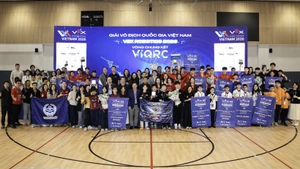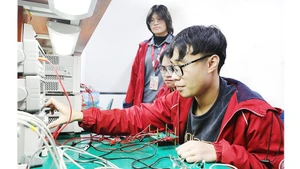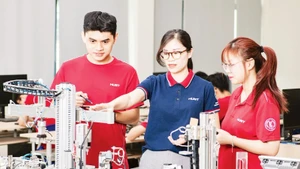Mai Ba Nghia, a student from the Department of Mechatronics at the School of Mechanical Engineering, Ha Noi University of Science and Technology, and his team are researching a product to assist people with impaired motor functions. The idea stemmed from Nghia himself when he broke his left arm in an accident. After surgery, he could not lift it himself, it gradually suffered muscular atrophy, so he had to experience physical therapy at the hospital. During the process, he always had to have a therapist accompany him, while the number of people in need of rehabilitation continues to rise.
After conducting surveys at several hospitals, Nghia’s team developed a product to support patients during physical rehabilitation. With this device, the patients can see simulated objects in virtual space, and can interact with the objects such as cups, rice bowls or balls, from which the research team will collect information about muscle strength to assess the patient's recovery level. Nghia shared that the group's biggest difficulty is capital.
In 2022, Tran Van Luc's group, a student from the Faculty of Computer Science at Ha Noi University of Science and Technology, researched and created a product to monitor and maintain drivers’ alertness based on brain-based technology. In 2024, the group raised 25,000 USD for the product research and development. Previously, the group faced many difficulties due to limited finances and unable to purchase necessary equipment for testing and research. Thanks to the capital raised, the group has accelerated the development of the project and achieved many positive results.
Capital is essential for startups, but students often face difficulty in raising capital. Without stable incomes or assets, they struggle to convince investors. In addition, investors often worry about investing in student managed projects due to their inexperience, instability, and high risk.
Many universities and non-profit organisations have also established funds to support student startups. However, to receive capital from this funding, certain criteria must be met.
Truong Cong Tuan, Director of the Center for Student Innovation and Entrepreneurship at Ha Noi University of Science and Technology, said that students’ startups meet difficulty in accessing capital because they lack knowledge of procedures for company establishment and operations. They also often neglect to study tax laws, business laws, and related procedures.
On October 30, 2017, the Prime Minister signed Decision No. 1665/QD-TTg, approving the project "Supporting students to startups until 2025". The project clearly states that universities, academies, colleges and junior colleges proactively allocate funds from their legal revenue sources to support activities, ideas and startup projects of their students.
After eight years, the project has created a strong shift in awareness and action in the student startup community. From 2020-2024, there were 33,808 of student startup projects, nearly 300 startups businesses, incubated by higher education institutions.
For students, Thach Le Anh, founder of VSV Startup Investment Fund, said that student startups that want to successfully raise capital need to focus on the following areas: financial technology (Fintech), the field attracting the strongest investment with e-wallet models; green technology and climate change (Greentech/Climate-tech) is an emerging but very potential trend. In addition, student startups need to startup by solving supply chain problems—optimising warehouses and managing smart logistics—creating attractive capital investments.
















